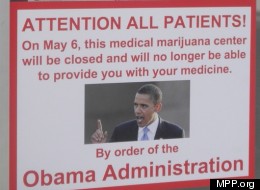Medical Marijuana: Obama's War On Pot Ramps Up In Colorado, Key Swing State
Thursday, May 10, 2012

#1 - I repeat, when he was running for president in 2008, Obama insisted that medical marijuana was an issue best left to state and local governments. "I'm not going to be using Justice Department resources to try to circumvent state laws on this issue," he vowed, promising an end to the Bush administration's high-profile raids on providers of medical pot, which is legal in 16 states and the District of Columbia.
#2 - There are no federal laws that allow for the sale of marijuana under any condition, neither in nor out of compliance with state laws, so the argument about state laws not overriding federal law is moot.
For the most part, those stores that are out of compliance were in their location before the regulations were created (and in some cases, before the schools were there), and had been grandfathered into the local law.
Read the Article at HuffingtonPost








